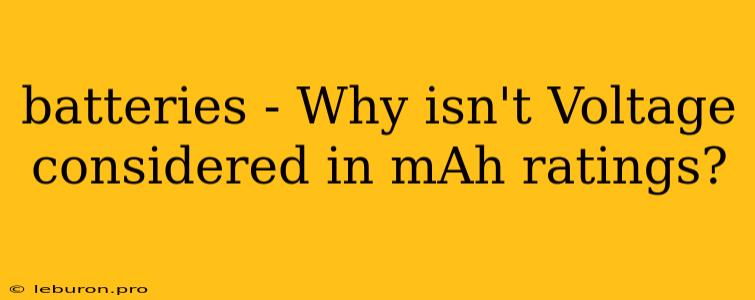The capacity of a battery is often expressed in milliampere-hours (mAh), a measure of how much charge it can store. However, voltage is not included in this rating. This might seem confusing at first, as voltage is an essential parameter in determining a battery's overall power output. So, why isn't voltage considered in mAh ratings? This article will delve into the reasons behind this seemingly strange omission and explore the relationship between mAh and voltage in battery performance.
Understanding mAh and Voltage
To understand why voltage isn't included in mAh ratings, we must first understand what each of these terms represents:
-
mAh (milliampere-hours): This measures the amount of electrical charge a battery can store. It essentially tells you how long the battery can deliver a certain amount of current before it runs out. A higher mAh rating indicates a larger capacity and longer runtime.
-
Voltage: This represents the electrical potential difference between the battery's terminals. Voltage determines the force with which electrons flow from the battery to the device. A higher voltage generally means more power.
Why Separate Ratings?
The reason for separate ratings lies in the fundamental nature of electricity. Imagine a battery as a water tank. mAh represents the tank's volume, while voltage represents the water pressure.
- Volume: A larger tank (higher mAh) can hold more water, allowing you to use it for a longer time.
- Pressure: Higher pressure (higher voltage) allows the water to flow faster and with more force, enabling you to power more demanding devices.
mAh: Measuring Charge Capacity
mAh essentially quantifies how much electrical charge a battery can deliver over time. It is a measure of capacity, similar to how a gallon measures the volume of liquid. It tells you how many milliamperes (mA) of current a battery can provide for a certain number of hours.
Example: A 2000 mAh battery can provide 2000 mA of current for one hour, 1000 mA for two hours, or 500 mA for four hours.
Voltage: Determining Power Output
Voltage, on the other hand, dictates the electrical potential difference between the battery terminals. It represents the force that pushes electrons through a circuit, much like water pressure in a pipe.
Example: A 12V battery has a higher voltage than a 3.7V battery, meaning it can deliver more power to a device. However, they might have the same mAh capacity, implying they can deliver the same amount of charge for the same duration.
The Importance of Both Ratings
While mAh measures the charge capacity and voltage signifies the electrical potential, both are crucial for determining a battery's overall performance and suitability for specific applications.
- Power: The power output of a battery is directly proportional to both its voltage and current. Power (Watts) = Voltage (Volts) × Current (Amps)
- Runtime: The runtime of a battery is primarily determined by its mAh rating. A higher mAh rating means a longer runtime for a given current draw.
Applications of mAh and Voltage
The importance of both mAh and voltage becomes apparent when considering different applications:
- Mobile Phones: Typically use batteries with relatively low voltage (3.7V to 4.2V) but high mAh ratings to provide extended talk time and standby time.
- Laptop Computers: Utilize batteries with higher voltage (10V to 19V) and higher mAh ratings to power demanding components like processors and graphics cards.
- Electric Vehicles: Employ batteries with very high voltage (hundreds of volts) and extremely high mAh ratings to provide the power and range needed for long drives.
Conclusion
In conclusion, the separate ratings for mAh and voltage are not arbitrary but rather reflect the fundamental nature of electricity. mAh measures the charge capacity, while voltage determines the force with which the charge is delivered. Understanding the interplay between these two parameters is essential for choosing the right battery for your specific needs. While a high mAh battery might provide long runtime, a low voltage might not power your device efficiently. Conversely, a high voltage battery with low mAh might provide a lot of power but only for a short duration. Recognizing the significance of both mAh and voltage ensures you select the battery that best meets your requirements and optimizes your device's performance.
